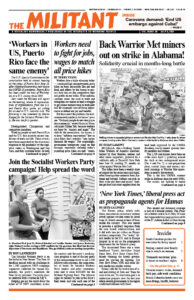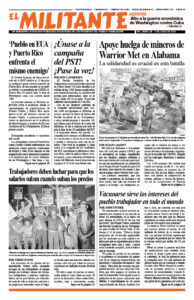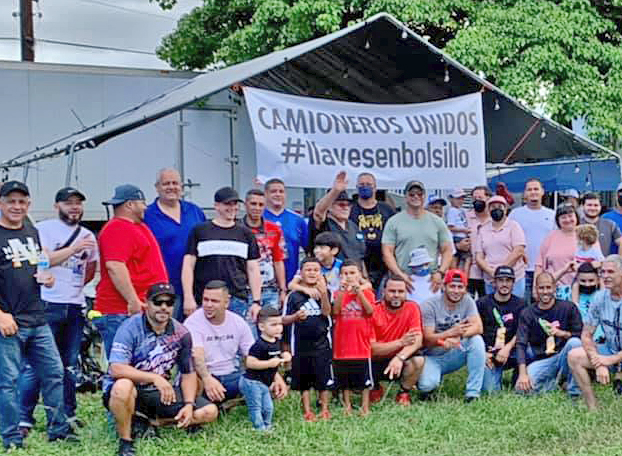“We often have to choose between buying a tire for our trucks and shopping for the basic needs of our families,” truck driver Carlos Schettini told the Militant by phone from San Juan June 14. “Fuel is going up, the price of tires, taxes, tolls keep rising, but not what we get paid.”
Schettini is a leader of Camioneros Unidos (United Truckers), which organizes nearly 80 drivers contracted by V. Suárez Group. Since June 8 truckers have been refusing to make deliveries until they get a rate increase.
“Keep your keys in your pocket,” reads one of their banners at an encampment they set up outside the company’s warehouse. Puerto Rican owned V. Suárez is one of the U.S. colony’s largest distributors of food, beverages and household goods.
There are some 40,000 independent truckers in Puerto Rico, Schettini says. Their fight is not just about the money. “Many companies push drivers to violate the federal law of the maximum driving hours in a day. And they overload the trucks.”
Taxi drivers, Coca-Cola bottling workers and other working people have been bringing food and other solidarity to the encampment.
In December the Puerto Rico transportation bureau increased the minimum rates for mileage and tonnage 35%, the first increase in nearly 30 years — with the exception of a small cost-of-living adjustment in 2005.
“A lot of companies don’t even comply with the old rates,” Schettini says.
But the U.S. government’s Financial Oversight and Management Board for Puerto Rico objected to the rate increase. Appointed by then-President Barack Obama, the board has the power to override decisions of the Puerto Rican government.
With imperial arrogance the board sent a letter to the Puerto Rican government Jan. 29 demanding that it “immediately desist from adjusting the rates.” That’s just a euphemism for squeezing everything possible out of the U.S. colony’s workers and farmers to pay some of the Puerto Rican government’s debt of $74 billion to capitalist bondholders.
In April, a court in Puerto Rico ruled in favor of a lawsuit brought by the Puerto Rico Chamber of Commerce challenging the rate increase.
The U.S. rulers and the local capitalist class underestimated the determination of truck owners. The Frente Amplio de Camioneros, an umbrella association of truckers across the island, Camioneros Unidos and others called for a “permanent assembly” — a work stoppage — if the rate hikes are reversed.
Carlos Rodríguez, organization secretary of the Frente Amplio, said by phone that this is not an idle threat. “We shut down the country in 1972, 1974, 1979 and 2005.” Worried about an island-wide action, the board a greed to “temporarily” allow the new rates to take effect, while the court decision is appealed and negotiations with the truckers continue.
While many of the independent drivers own just one truck, some own 10, 20 or more, Rodríguez said. Big manufacturers and distributors find it more profitable to push all the costs of the truck onto the independent operators instead of buying their own fleet of trucks and hiring drivers. “The big companies tell the independent drivers, ‘take it or leave it,’” Rodríguez says. “But we are the backbone of Puerto Rico. Nothing moves without us.”
There have been other actions by truckers over the last several weeks demanding higher pay and opposing any moves toward “deregulating” trucking rates that would open the door to further attacks on drivers’ incomes.
Selling the island ‘piece by piece’
“The government has been selling the island piece by piece,” Schettini says, pointing to the decision of Gov. Pedro Pierluisi to award a contract to Luma Energy to take over management of the public electric company on June 1, a move pushed by the U.S. financial board. They aim to weaken the union and pave the way for more assaults on workers’ wages and conditions.
After just two days on strike at the Peruvian-owned Swiss Dairy in Ponce, some 50 workers won a union contract June 2. “We won a wage increase of 35 cents an hour the first two years and 40 cents the third, an increase in medical coverage and more vacation and sick days,” José Adrián López, president of the CGT union federation, said by phone.


